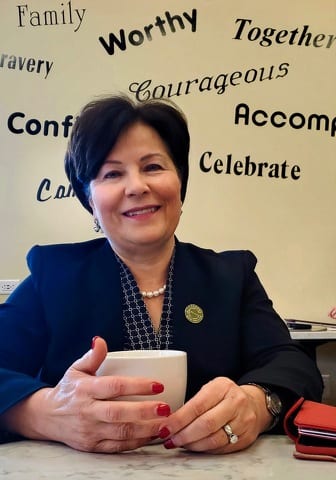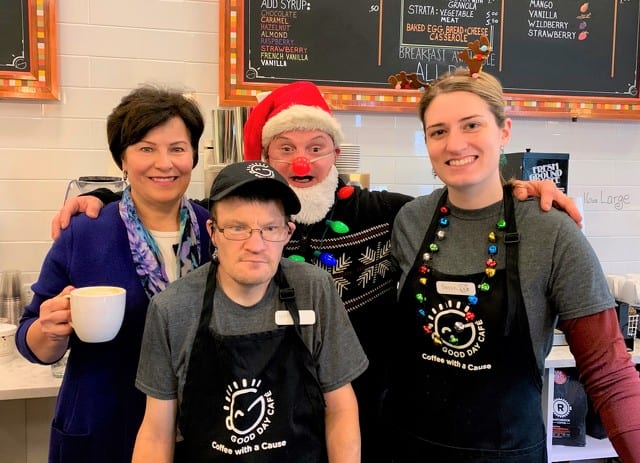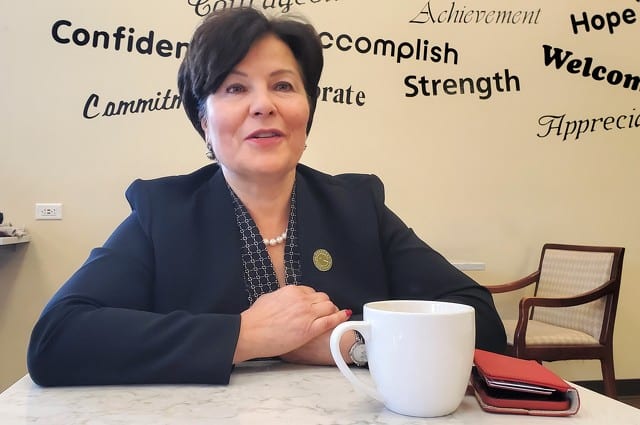If you tried to highlight a demanding job, I think you’d be hard-pressed to name one with more challenges than CEO of a non-profit organization that serves individuals with mental illness or intellectual disability.
And that’s why I was so intrigued to learn that Cindy Pasquinelli would reach the 35-year threshold of service with Strawberry Fields this month. I wanted to know what makes this woman tick and what keeps her ticking.
So I spoke with Ellen Campbell, my fellow graduate from State High’s Class of 1970, who has served on the Strawberry Fields board of directors for two decades. She offered an amazing list of positive attributes for Pasquinelli.
“She is courageous, innovative, a good listener, a teacher, a diplomat, a visionary, and a true inspiration,” Ellen said.
I also talked to Brent Pasquinelli, Cindy’s husband and true soulmate who served for 15 years as co-chairman (with Sue Paterno) of Pennsylvania’s Special Olympics.
“She deals with a lot of unpleasant things that 99% of our population is not subjected to,” he said. “There are times when it really drains her emotionally, but she’s committed to the cause. What moves her is to see the joy and the happiness of her clients’ success; the positive comments from the family members.”
And I sat down with Pasquinelli to review her memories. I asked about her life and her career, but like any good mom, she began with comments on her children. She told me about her firstborn, her son David, who arrived in 1983, is now married to Michelle Arjmand and is the father of Brent, age 8.
And then she told me about her second offspring, the non-profit agency named Strawberry Fields that she adopted in 1985, an organization that embraces more than 200 employees and serves more than 850 clients with an annual budget of more than $8 million. Here are edited portions of our conversation at Good Day Café, the Strawberry Fields enterprise that provides jobs for some of the agency’s clients.
I remember you talking about the first time you ever heard the name “Strawberry Fields” here in State College. What was your reaction to that name?
Pasquinelli: I thought, “What kind of group of hippies is this, and why are they advertising all the time?” But two years after giving birth to my son, David, and doing some part-time work at the university, I was ready to go back to work. So I applied to Strawberry Fields and I was interviewed and I became the director of mental health services in March of 1985. I fully intended to have another child; I really did. But what happened was this organization became my second child.
When I started with Strawberry Fields, we might’ve had 35 employees. We had a couple of group homes, a case management program, and we had this mental health residential program that I was in charge of. But the winds of change allowed us to grow. Decisions had been made to close some state institutions; people were beginning to value community care and how important it is to live in your own home. So when Marsha Bartlett, the executive director who hired me, did not return from her maternity leave, I became the interim executive director in the fall of 1987.
What was Strawberry Fields like in 1985 or 1987?
Pasquinelli: Our office was out in Stowaway, the storage facility. We had a very small office there because our programs were embedded in the community as they are today. Our conference table was an old door on two sawhorses. The board of directors would come in and sit around that table, and some of them still laugh about that.
How would you define the organization as it exists in 2020?
Pasquinelli: Well, we do have a mission statement and it’s basically about empowering people. What we try to do in every single program is to meet people where they’re at—the family with a baby that has a delay or disability, the adult with mental illness or the adult with intellectual disabilities. We try to help them be the best they can be and to live an independent life that is authored by them, not by us.
Our mission statement is “Empowering individuals and enriching lives.” That’s what we say we try to do every day. But it’s easier said than done, as you can imagine.
How does it strike you to realize you’re approaching your 35th anniversary of working for Strawberry Fields?
Pasquinelli: Oh my goodness, it’s daunting.
Why do you say “daunting?”
Pasquinelli: I guess it’s just the number of years. I’ve been so busy and so focused on growing the organization and developing the staff that I haven’t spent a lot of time looking back. There’s a time to look back and reflect, and we have done that on mistakes that we’ve made. But I’m a pretty optimistic person and I’m looking forward. My job is to come in every day and rally everyone to get excited about the mission and why we’re there. That never ends, right?
So I hear you saying that you normally don’t reflect too much, but maybe you don’t mind doing a little reflection as your 35-year anniversary approaches. Can you talk about some of your warmest memories?
Pasquinelli: That’s a very, very hard question. I mean, that’s going way back. Well, opening our first group home—actually we opened three homes—as a result of Laurelton closing. (Laurelton State School and Hospital was operated in Union County for mentally handicapped adults until 1995.) That was a huge, huge project for us, but it was oh so gratifying to move those individuals into the community and see them happy and thriving and growing. That felt really good.
How would you describe their previous experience?
Pasquinelli: Many of them had lived there (Laurelton) most of their lives, so that was home to them. But they didn’t know what they didn’t know. There were many wonderful staff there, loving lifelong staff who cared for these folks. So it was very difficult for them to move. But one of the reasons why I gravitated to this work was because I wanted to find out more about the mental health system and how I could make a difference. I wanted to try to find a more humane way to deal with people and with this stigma—the stigma that existed at the time and still exists today for people who have a mental illness or intellectual disability. How do we as an organization educate the community about the gifts and values that these individuals bring to the table?

Cindy Pasquinelli has put her heart into Strawberry Fields since she joined the agency in 1985. Photo by Bill Horlacher
What are some of your other memories, other breakthroughs for Strawberry Fields?
Pasquinelli: Well, as I sit here with you today, in Good Day Cafe, this represents an opportunity for our organization to be really visible in the community. Our other services are private, HIPAA protected and confidential. We’ve never advertised the locations of our group homes, and we’ve never put signs on our vehicles. And all of that is for the dignity and privacy of our (clients). But then, through Ellen Campbell, we got the vision to start Scraps & Skeins. That store gave us some public exposure, but of course not everyone in State College is interested in sewing or quilting or knitting. Everyone can enjoy a good cup of coffee at Good Day Café.
And both enterprises are providing jobs for people who might not otherwise have a chance for employment.
Pasquinelli: Yes, we realized that there was truly a need for employment for the individuals that we are serving that don’t have regulations and limitations attached to the terms of their employment. At Scraps & Skeins, they just celebrated their fifth anniversary; they’ve been open five years. And that was when we said to ourselves, “Oh boy, we’re on to something here.” We employ six individuals; they’re in recovery from mental illness. We see the value of having a place for them to go, the value of supportive people who care about them and the value of having a job and feeling needed. So Scraps & Skeins helped pave the way for Good Day Café.
I think the key for us is meeting people where they are at. Helping these people to live in the community, to work and to begin to thrive. And when you see individuals who were afraid to leave their apartment or who had come out of an institution and were very afraid of venturing into the community…then you see them go to Walmart for the first time and shop for the first time and carry their own purse with their own money. It’s pretty wonderful.
I asked you about your warm memories, but I should also ask about the sad ones. I’m sure there have been some of those.
Pasquinelli: Yes. What sticks out is having to call a mother to tell her that her son committed suicide.
Has that happened often?
Pasquinelli: No, just once. But that was enough.
What about your funniest memories?
Pasquinelli: The funniest times are in the office and we are able to laugh at situations that come up. So it might be the result of pressure or frustration, but you can laugh or you can cry. Of course, we do cry sometimes, when we are unable to successfully serve people or get them to understand their need for treatment. I’m talking about adults with mental illness. But when things work, it’s so, so wonderful.
As I sit here and I look at the individuals here working in this cafe, I’m seeing a young lady over there who was in one of our residential programs. She graduated from there and now lives in our Fairweather Lodge, a program where four residents operate the house themselves. She was one of our first employees here and she was one of the first to be promoted from “barista back” to “barista.” She didn’t think she could do it, so as I look at her now, I’m thinking, “Yeah, that’s why we do this.”
I know you’re a football fan, so you’re probably aware that a quarterback often gets more credit than he deserves when his team wins and more blame than he deserves when the team loses. Does that apply to you?
Pasquinelli: Oh yes. I learned a long time ago the light that’s reflected on me by the success of our team shines more brightly than any spotlight focused on me. We’ve gotten a lot of wonderful press over the years, but I’m not responsible. Believe me, it’s about the staff that come every day to work in our group homes. And it’s about the mental health case managers who are in this community every day.
And when things don’t go well?
Pasquinelli: Well, when you’re dealing with people, especially with the complexities of the individuals we serve, things happen.
And you get the blame?
Pasquinelli: One instance stands out. Oh man, there have been many, but this one in particular. We had opened a home in one of the townships, and it was a novel concept at the time because it was a home where individuals in recovery from mental illness live and work together—there aren’t any staff there on a regular basis to support them. And because there were four individuals in this home, we had to go to a zoning hearing where the neighbors got to raise their concerns. Now I knew that the law was on our side and I knew that we were going to prevail because the state looks at our homes as a family. And that’s why we’re allowed to have four unrelated people living together versus a typical situation where three is the limit. But I had to endure neighbors, people I didn’t really know, testifying one right after the other about why this home should not exist. It was very painful.
Did it get personal?
Pasquinelli: Oh yes. Personal with respect to the stigma surrounding mental illness and the stories that have manifested themselves over what it means to be mentally ill. “Are they scary, are they violent?” You know, there’s a saying that says “not in my backyard.” So it was a case of people saying, “I support these services but not in my backyard.” I tried not to take it personally although I had to stand there and answer those questions.
Well, we opened the home, and I think the neighbors would say that we’ve been good neighbors and that we blend in like everybody else. In a lot of the areas where our homes are, our neighbors are our friends, and they help us out. They become very close to our people who live there. And that feels good.
From your perspective, what are State College’s greatest strengths and greatest limitations?
Pasquinelli: State College’s greatest strengths are the people who live here who are kind, who are giving, who have wrapped their arms around Strawberry Fields. We’ll be forever grateful for the people in this town who believe in us. We are so lucky. I am so grateful.
What about State College’s limitations?
Pasquinelli: Looking at this today in 2020, it’s the workforce. We, like many other employers, are struggling to find workers to work in our group homes and in our other services. It’s hard work. Supporting people with complex needs is challenging. Sometimes it’s frustrating, but when you see them take that next step, it makes it all worthwhile. Luckily, we have Penn State University here, and so they’ve always fueled us with a lot of students who have worked for us for two or three years. But that has changed a lot in the last few years. Many students aren’t working these days, so that’s our challenge. The workforce is really, really a challenge.
Are you about to start advertising for employees?
Pasquinelli: We have been. And we’ve raised our salaries. And we have sign-on bonuses. We’re doing everything we can, because our success is about the quality of the people who are working with our people. I can promise the moon to a funder who wants us to open a program, but we’re only as good as the individuals who are working in that home.
What projects are in your short-term or mid-term focus?
Pasquinelli: We’re asked all the time if we are going to open more homes for individuals with intellectual disabilities or autism. And we’re in the process of opening a home in the Borough that’s going to serve three such individuals. And if you’re talking about community support, this home is such a fine example of that. Marcon Roofing put a new roof on that house, saving us about $10,000. And the Benkovic Foundation gave us $20,000 for the repairs and renovations that the home needed to be ready for these individuals. So the community has been there every step of the way for us.
What else is in your vision for Strawberry Fields?
Pasquinelli: Well, in the short run, we want to get Good Day Cafe to a profitable point where we can employ others with disabilities. We have 38 people who are waiting for jobs right now, and I don’t like that. And right now, we are in the process of planning for the future. We’re going to hire an operating officer who could possibly be our next CEO. Am I going to be here three years? Am I going to be here five years? I don’t know. But I’m not ready to retire. I still have a lot of things that I would like to accomplish that are needed for the people that we serve.

Cindy Pasquinelli and employees at Good Day Cafe demonstrate their holiday spirit.



